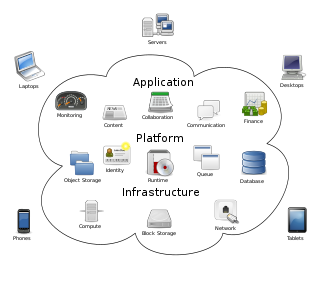
Amazon Web Services, Inc. (AWS) is a subsidiary of Amazon that provides on-demand cloud computing platforms and APIs to individuals, companies, and governments, on a metered, pay-as-you-go basis. Clients will often use this in combination with autoscaling. These cloud computing web services provide various services related to networking, compute, storage, middleware, IoT and other processing capacity, as well as software tools via AWS server farms. This frees clients from managing, scaling, and patching hardware and operating systems. One of the foundational services is Amazon Elastic Compute Cloud (EC2), which allows users to have at their disposal a virtual cluster of computers, with extremely high availability, which can be interacted with over the internet via REST APIs, a CLI or the AWS console. AWS's virtual computers emulate most of the attributes of a real computer, including hardware central processing units (CPUs) and graphics processing units (GPUs) for processing; local/RAM memory; hard-disk (HDD)/SSD storage; a choice of operating systems; networking; and pre-loaded application software such as web servers, databases, and customer relationship management (CRM).
Gluster Inc. was a software company that provided an open source platform for scale-out public and private cloud storage. The company was privately funded and headquartered in Sunnyvale, California, with an engineering center in Bangalore, India. Gluster was funded by Nexus Venture Partners and Index Ventures. Gluster was acquired by Red Hat on October 7, 2011.
Amazon Simple Storage Service (S3) is a service offered by Amazon Web Services (AWS) that provides object storage through a web service interface. Amazon S3 uses the same scalable storage infrastructure that Amazon.com uses to run its e-commerce network. Amazon S3 can store any type of object, which allows uses like storage for Internet applications, backups, disaster recovery, data archives, data lakes for analytics, and hybrid cloud storage. AWS launched Amazon S3 in the United States on March 14, 2006, then in Europe in November 2007.

Amazon Elastic Compute Cloud (EC2) is a part of Amazon's cloud-computing platform, Amazon Web Services (AWS), that allows users to rent virtual computers on which to run their own computer applications. EC2 encourages scalable deployment of applications by providing a web service through which a user can boot an Amazon Machine Image (AMI) to configure a virtual machine, which Amazon calls an "instance", containing any software desired. A user can create, launch, and terminate server-instances as needed, paying by the second for active servers – hence the term "elastic". EC2 provides users with control over the geographical location of instances that allows for latency optimization and high levels of redundancy. In November 2010, Amazon switched its own retail website platform to EC2 and AWS.

The Rackspace Cloud is a set of cloud computing products and services billed on a utility computing basis from the US-based company Rackspace. Offerings include Cloud Storage, virtual private server, load balancers, databases, backup, and monitoring.

Cloud computing is the on-demand availability of computer system resources, especially data storage and computing power, without direct active management by the user. Large clouds often have functions distributed over multiple locations, each of which is a data center. Cloud computing relies on sharing of resources to achieve coherence and typically uses a pay-as-you-go model, which can help in reducing capital expenses but may also lead to unexpected operating expenses for users.
Eucalyptus is a paid and open-source computer software for building Amazon Web Services (AWS)-compatible private and hybrid cloud computing environments, originally developed by the company Eucalyptus Systems. Eucalyptus is an acronym for Elastic Utility Computing Architecture for Linking Your Programs To Useful Systems. Eucalyptus enables pooling compute, storage, and network resources that can be dynamically scaled up or down as application workloads change. Mårten Mickos was the CEO of Eucalyptus. In September 2014, Eucalyptus was acquired by Hewlett-Packard and then maintained by DXC Technology. After DXC stopped developing the product in late 2017, AppScale Systems forked the code and started supporting Eucalyptus customers.
An Amazon Machine Image (AMI) is a special type of virtual appliance that is used to create a virtual machine within the Amazon Elastic Compute Cloud ("EC2"). It serves as the basic unit of deployment for services delivered using EC2.

Amazon Virtual Private Cloud (VPC) is a commercial cloud computing service that provides a virtual private cloud, by provisioning a logically isolated section of Amazon Web Services (AWS) Cloud. Enterprise customers can access the Amazon Elastic Compute Cloud (EC2) over an IPsec based virtual private network. Unlike traditional EC2 instances which are allocated internal and external IP numbers by Amazon, the customer can assign IP numbers of their choosing from one or more subnets.

Amazon Elastic Block Store (EBS) provides raw block-level storage that can be attached to Amazon EC2 instances and is used by Amazon Relational Database Service (RDS). It is one of the two block-storage options offered by AWS, with the other being the EC2 Instance Store.
Amazon Relational Database Service is a distributed relational database service by Amazon Web Services (AWS). It is a web service running "in the cloud" designed to simplify the setup, operation, and scaling of a relational database for use in applications. Administration processes like patching the database software, backing up databases and enabling point-in-time recovery are managed automatically. Scaling storage and compute resources can be performed by a single API call to the AWS control plane on-demand. AWS does not offer an SSH connection to the underlying virtual machine as part of the managed service.
Elasticsearch is a search engine based on Apache Lucene. It provides a distributed, multitenant-capable full-text search engine with an HTTP web interface and schema-free JSON documents. Official clients are available in Java, .NET (C#), PHP, Python, Ruby and many other languages. According to the DB-Engines ranking, Elasticsearch is the most popular enterprise search engine.

Abiquo Hybrid Cloud Management Platform is a web-based cloud computing software platform developed by Abiquo. Written entirely in Java, it is used to build, integrate and manage public and private clouds in homogeneous environments. Users can deploy and manage servers, storage system and network and virtual devices. It also supports LDAP integration.
Backend as a service (BaaS), sometimes also referred to as mobile backend as a service (MBaaS), is a service for providing web app and mobile app developers with a way to easily build a backend to their frontend applications. Features available include user management, push notifications, and integration with social networking services. These services are provided via the use of custom software development kits (SDKs) and application programming interfaces (APIs). BaaS is a relatively recent development in cloud computing, with most BaaS startups dating from 2011 or later. Some of the most popular service providers are AWS Amplify and Firebase.

Datadog, Inc. is an American company that provides an observability service for cloud-scale applications, providing monitoring of servers, databases, tools, and services, through a SaaS-based data analytics platform. Founded and headquartered in New York City, the company is a publicly traded entity on the Nasdaq stock exchange. The mascot is a dog named Bits.
Scality is a global technology provider of software-defined storage (SDS) solutions, specializing in distributed file and object storage with cloud data management. Scality maintains offices in Paris (France), London (UK), San Francisco and Washington DC (USA), and Tokyo (Japan) and has employees in 14 countries.
Autoscaling, also spelled auto scaling or auto-scaling, and sometimes also called automatic scaling, is a method used in cloud computing that dynamically adjusts the amount of computational resources in a server farm - typically measured by the number of active servers - automatically based on the load on the farm. For example, the number of servers running behind a web application may be increased or decreased automatically based on the number of active users on the site. Since such metrics may change dramatically throughout the course of the day, and servers are a limited resource that cost money to run even while idle, there is often an incentive to run "just enough" servers to support the current load while still being able to support sudden and large spikes in activity. Autoscaling is helpful for such needs, as it can reduce the number of active servers when activity is low, and launch new servers when activity is high. Autoscaling is closely related to, and builds upon, the idea of load balancing.
An elastic cloud is a cloud computing offering that provides variable service levels based on changing needs.
This is a timeline of Amazon Web Services, which offers a suite of cloud computing services that make up an on-demand computing platform.
Serverless computing is a cloud computing execution model in which the cloud provider allocates machine resources on demand, taking care of the servers on behalf of their customers. Serverless is a misnomer in the sense that servers are still used by cloud service providers to execute code for developers. However, developers of serverless applications are not concerned with capacity planning, configuration, management, maintenance, fault tolerance, or scaling of containers, virtual machines, or physical servers. When an app is not in use, there are no computing resources allocated to the app. Pricing is based on the actual amount of resources consumed by an application. It can be a form of utility computing.




